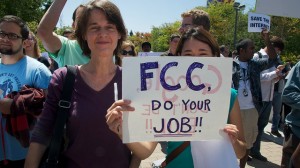Update: Due to server outages yesterday on its website because of too much traffic, the Federal Communications Commission has extended the deadline for the first round of public comments on its proposed rulemaking for the Open Internet through Friday, July 18. In other words, Net neutrality – equal access to the Internet for all. According to Brian Fung at The Washington Post, as of Tuesday afternoon, 780,000 comments had been received so far, reflecting, as the commission noted last week, “widespread public engagement. Consumers care about protecting and promoting Internet openness and we welcome their views on how to do so.”
A decision will be made later this year. How the commission will act depends in part on how they respond to continuing public pressure. So keep your messages coming. Email the FCC at: openinternet [AT] fcc.gov. Tell them why you think an Open Internet is essential and while you’re at it, ask the FCC to hold official open hearings on Net neutrality around the country so they can hear what real people have to say outside the Washington bubble.
Read this essay first published in May by Bill Moyers and Michael Winship and note the box at the end which describes other ways you can participate in the fight to keep the Internet open, equal and available to all. And don’t worry – if you don’t get to contact the FCC this week, there’s still plenty of time to let them know what you think, loud and clear.

Net Neutrality protest at Google HQ (Photo: Flickr / Steve Rhodes / CC 2.0)
“We have to ensure [a] free and full exchange of information and that starts with an open Internet,” he said in a speech at Google headquarters, the presidium of cyberspace. “I will take a backseat to no one in my commitment to network neutrality, because once providers start to privilege some applications or websites over others, then the smaller voices get squeezed out and we all lose. The Internet is perhaps the most open network in history and we have to keep it that way.”
He said it many more times. And defenders of Net neutrality believed him, that he would preserve Internet access for all, without selling out to providers like Verizon and Comcast who want to charge higher fees for speedier access – hustling more cash from those who can afford to buy a place at the front of the line. On this issue so important to democracy, they believed he would keep his word, would see to it that when private interests set upon the Internet like sharks to blood in the water, its fate would be in the hands of honest brokers who would listen politely to the pleas of the greedy, and then show them the door.
Unfortunately, it turned out to be Washington’s infamous revolving door. Last May, President Obama named Tom Wheeler to be FCC chairman. He had other choices, men or women whose loyalty was to the public, not to rich and powerful corporations. But Tom Wheeler had been one of Obama’s top bundlers of campaign cash – both in 2008 and again in 2012, when he raised at least half a million dollars for the president’s re-election. Like his proposed new rules for the Web, that put him at the front of the line.
What’s more, Wheeler had been the top gun for both the National Cable and Telecommunications Association (NCTA) and the Cellular Telecommunications and Internet Association (CTIA), lobbyists for the cable and wireless industries. However we might try to imagine that he could quickly abandon old habits of service to his employers, that’s not how Washington works. Business and government are now so intertwined that public officials and corporate retainers are interchangeable parts of what Chief Justice John Roberts might call “the gratitude machine.”
Remember the FCC chairman under George W. Bush? Michael Powell was no champion of Net neutrality then, and now he works for its evisceration as CEO of the NCTA, the cable industry’s trade association, the same job Chairman Wheeler held three decades ago. Round and round they go, and where they stop – actually they never stop. They just flash their EZ Pass as they keep shuttling through that revolving door.
Consider: Daniel Alvarez was a long-time member of a law firm that has advised Comcast. He once wrote to the FCC on behalf of that giant, arguing against Net neutrality rules. He’s been hired by Tom Wheeler.
Former Ambassador Phillip Verveer also worked for Comcast and the wireless and cable trade associations, both of which have opposed Net neutrality. He’s now Tom Wheeler’s senior counselor.
Attorney Brendan Carr worked for Verizon and the telecom industry’s trade association, which lobbied against Net neutrality. Now Brendan Carr is an adviser to FCC Commissioner Ajit Pai, who once described open Internet rules as a “solution in search of a problem” and used to be a top lawyer for Verizon.
To be fair, Tom Wheeler has brought media reformers into the FCC, too, and has been telling us all that we don’t understand – that we’re the victims of “misinformation” about the new rules – that he is still for Net neutrality. Possibly. But the public’s no chump, and as you can see from just those few examples from the reporting of intrepid young journalist Lee Fang, those new rules are not the product of an immaculate conception. They were hatched in a place where industry midwives huddle around the cradle, waiting to privatize — sorry, baptize — the new arrival, and claim him for their own. Everyone else — nonprofit groups, startups, the smaller, independent content creators and everyday users – move to the rear. The Net will be neutral no more.
President Obama could stiffen Tom Wheeler’s spine with one phone call. That’s not likely, given the broken promises that litter the White House grounds. You can send an e-mail to make your opinion known at openinternet [AT] fcc.gov. Or direct a tweet to Wheeler @TomWheelerFCC.
Speak up. You have a chance to tell both Obama and Wheeler what you think, so that the will of the people, not the power of money and predatory interests, is heard.
Additional Resources
» File your public comment using this handy form from Common Cause.
» Save the Internet has a sample script, an email petition and instructions on how to call Wheeler and request that the chairman abandon his proposal.
» Using WhiteHouse.gov’s We the People site, critics of the new proposal have also launched a petition, calling for “nothing less than complete neutrality in our communication channels.” It already has over 40,000 signatures.
» A second petition asks the FCC to reclassify broadband as a regulated common-carrier service, which means it would have to be open to all, and serve all customers without discrimination. Currently broadband is classified as an information service, a category that gives the FCC a fairly limited set of regulatory options.
» There are a number of other organizations that are working on maintaining Net neutrality, including: Access, CREDO Action, Demand Progress, Fight for the Future, Free Press, Open Technology Institute, Public Knowledge, Voices for Internet Freedom



